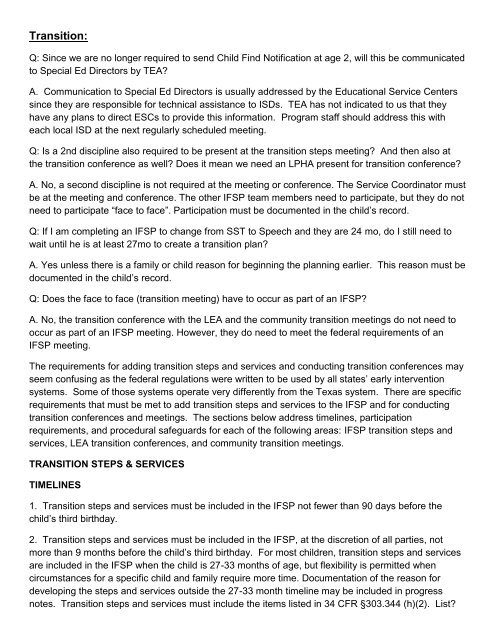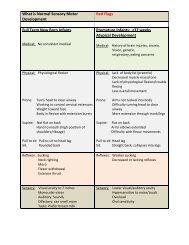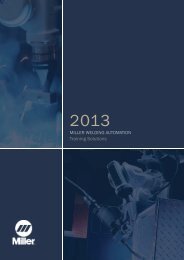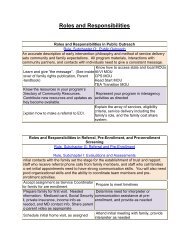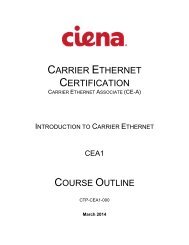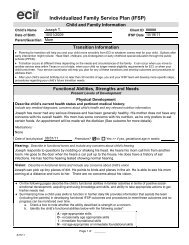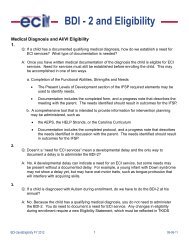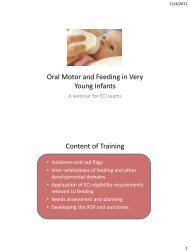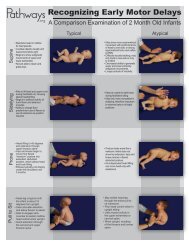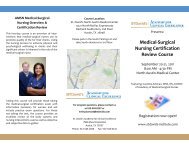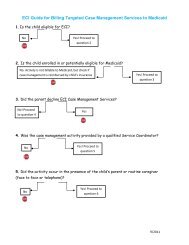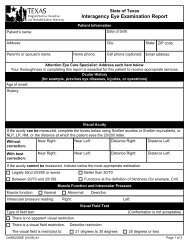Transition: - ABC Signup
Transition: - ABC Signup
Transition: - ABC Signup
You also want an ePaper? Increase the reach of your titles
YUMPU automatically turns print PDFs into web optimized ePapers that Google loves.
<strong>Transition</strong>:<br />
Q: Since we are no longer required to send Child Find Notification at age 2, will this be communicated<br />
to Special Ed Directors by TEA<br />
A. Communication to Special Ed Directors is usually addressed by the Educational Service Centers<br />
since they are responsible for technical assistance to ISDs. TEA has not indicated to us that they<br />
have any plans to direct ESCs to provide this information. Program staff should address this with<br />
each local ISD at the next regularly scheduled meeting.<br />
Q: Is a 2nd discipline also required to be present at the transition steps meeting And then also at<br />
the transition conference as well Does it mean we need an LPHA present for transition conference<br />
A. No, a second discipline is not required at the meeting or conference. The Service Coordinator must<br />
be at the meeting and conference. The other IFSP team members need to participate, but they do not<br />
need to participate “face to face”. Participation must be documented in the child’s record.<br />
Q: If I am completing an IFSP to change from SST to Speech and they are 24 mo, do I still need to<br />
wait until he is at least 27mo to create a transition plan<br />
A. Yes unless there is a family or child reason for beginning the planning earlier. This reason must be<br />
documented in the child’s record.<br />
Q: Does the face to face (transition meeting) have to occur as part of an IFSP<br />
A. No, the transition conference with the LEA and the community transition meetings do not need to<br />
occur as part of an IFSP meeting. However, they do need to meet the federal requirements of an<br />
IFSP meeting.<br />
The requirements for adding transition steps and services and conducting transition conferences may<br />
seem confusing as the federal regulations were written to be used by all states’ early intervention<br />
systems. Some of those systems operate very differently from the Texas system. There are specific<br />
requirements that must be met to add transition steps and services to the IFSP and for conducting<br />
transition conferences and meetings. The sections below address timelines, participation<br />
requirements, and procedural safeguards for each of the following areas: IFSP transition steps and<br />
services, LEA transition conferences, and community transition meetings.<br />
TRANSITION STEPS & SERVICES<br />
TIMELINES<br />
1. <strong>Transition</strong> steps and services must be included in the IFSP not fewer than 90 days before the<br />
child’s third birthday.<br />
2. <strong>Transition</strong> steps and services must be included in the IFSP, at the discretion of all parties, not<br />
more than 9 months before the child’s third birthday. For most children, transition steps and services<br />
are included in the IFSP when the child is 27-33 months of age, but flexibility is permitted when<br />
circumstances for a specific child and family require more time. Documentation of the reason for<br />
developing the steps and services outside the 27-33 month timeline may be included in progress<br />
notes. <strong>Transition</strong> steps and services must include the items listed in 34 CFR §303.344 (h)(2). List
3. Most of the time, adding transition steps and services will occur at a regularly scheduled IFSP<br />
meeting: initial, annual, or periodic review, as the timeline for adding the steps and services covers a<br />
6 month time span.<br />
4. Updates to the transition steps and services may be documented in service coordination progress<br />
notes, on the IFSP form, or may require an IFSP periodic review. Review the required elements<br />
documents for IFSPs, IFSP reviews, and <strong>Transition</strong> to determine the best way to update the transition<br />
steps and services.<br />
IFSP PARTICIPATION<br />
Q: If transition steps are added at the initial or annual IFSP meeting, who are the required participants<br />
and what limitations if any exist for how these required participants participate I missed some of the<br />
speakers explanation re complying with the federal requirements ….(do these supersede the TAC<br />
rules when referenced)<br />
Q: When this is held at an initial or annual IFSP meeting who are the required participants and what<br />
limitations exist if any for how each of the required participants participate<br />
Q: Are there different requirements for when transition steps and services are first developed and<br />
added to either the initial or annual IFSP and when they are updated in terms of required participants<br />
and how those participants participate<br />
1. Service coordinators and parents participate in all IFSP meetings. Other participants, and means<br />
of participation, vary according to parent request and consent, type of IFSP meeting, and the<br />
activities that will take place at the meeting. Participants in the initial and annual IFSP meetings, and<br />
means of participation, are specified in 40 TAC §§108.1009 and 108.1011. Periodic reviews must<br />
include the parent, service coordinator, and other persons requested by the parent. Participants for<br />
periodic reviews are specified in 34 CFR §303.343(b).<br />
2. Participation for those not required to attend a meeting in person may be by telephone conference<br />
call, having a knowledgeable representative attend the meeting, or making pertinent records<br />
available.<br />
IFSP PROCEDURAL SAFEGUARDS<br />
All IFSP procedural safeguards apply to all types of IFSP meetings: initial, annual, and periodic<br />
review. Procedural safeguards include notices, consents, and confidentiality.<br />
LEA TRANSITION CONFERENCE<br />
Q: Developing the steps and services can be a different meeting than the conference meeting but<br />
both must meet the requirements of the IFSP meeting<br />
A. Yes<br />
TIMELINES<br />
A transition conference must be convened, with parental approval, for children determined potentially<br />
eligible for PPCD. The conference must be held at least 90 days, and, at the discretion of all parties,
not more than 9 months before the child’s third birthday. As with the addition of transition steps and<br />
services to the IFSP, flexibility is allowed in scheduling the transition conference more that 9 months<br />
before the child’s third birthday. Documentation of the reason for convening the conference outside<br />
the 27-33 month timeline may be included in progress notes. A conference is not required for<br />
children referred less than 90 days before the child’s third birthday.<br />
LEA TRANSITION CONFERENCE PARTICIPATION<br />
Q: What other means are acceptable for the second member of the team to participate in the<br />
transition conference.<br />
Q: A transition conference held at a time other than the initial, annual or complete review, is<br />
considered a "partial review, transition conference only, no changes to services' type of IFSP,<br />
correct<br />
A: If the transition conference results in a change in ECI planned services then you would complete<br />
the complete review revision to services. If the transition conference does not change ECI planned<br />
services then it is entered as a transition conference only and there is no corresponding IFSP<br />
entered.<br />
40 TAC §108.1203 specifies participants for the LEA transition conference include the parent, service<br />
coordinator, an LEA representative if possible, and at least one other ECI professional who is a<br />
member of the IFSP team. The other IFSP team member may participate through other means as<br />
permitted in 34 CFR 303.343(a)(2), the same as an IFSP meeting.<br />
If the transition conference is conducted separately from an initial, annual, or complete review of the<br />
IFSP,<br />
LEA TRANSITION CONFERENCE PROCEDURAL SAFEGUARDS<br />
LEA transition conferences must be conducted according to federal requirements for an IFSP<br />
meeting as specified in 34 CFR §§303.342, 303.343, and 303.344. All IFSP procedural safeguards<br />
apply including notices, consents, and confidentiality.<br />
COMMUNITY TRANSITION MEETINGS<br />
Q: Does the transition community meeting have to be held in accordance with the IFSP requirements<br />
for a transition conference<br />
TIMELINES<br />
There are no timelines specified if the CFR or Rules regarding community transition meetings.<br />
<strong>Transition</strong> services are provided to assist a child and family to exit from early intervention services.<br />
Convening community transition meetings on a timely basis gives families the opportunity to explore<br />
options before the child’s third birthday.<br />
PARTICIPATION<br />
40 TAC §108.1221 specifies participants for the community transition meeting include the parent, ECI<br />
staff (service coordinator and another team member), representatives of community settings, Division
for Blind Services or Office for Deaf and Hard of Hearing regional specialist, if appropriate, and other<br />
program or agency representative as appropriate. The other IFSP team member may participate<br />
through other means as permitted in 34 CFR 303.343(a)(2).<br />
COMMUNITY MEETING PROCEDURAL SAFEGUARDS<br />
Community transition meetings must be conducted according to federal requirements for an IFSP<br />
meeting as specified in 34 CFR §§303.342, 303.343, and 303.344. All IFSP procedural safeguards<br />
apply including notices, consents, and confidentiality.<br />
Service Coordinator/EIS Requirements<br />
Q: Is a Service coordinator who has an LBSW able to do an initial or annual IFSP meeting with an<br />
EIS<br />
A: The LBSW and the EIS can both participate as team members but there must be an LPHA on the<br />
IFSP team. 40 TAC §108.1009(b)(1) states that at least one of the two ECI professionals must be an<br />
LPHA. A LBSW is not an LPHA. According to Rule §108.103 (25), a LPHA is a Licensed Practitioner<br />
of the Healing Arts. LPHAs include: licensed physicians, registered nurses, licensed physical<br />
therapists, licensed occupational therapists, licensed speech language pathologists, licensed<br />
professional counselors, licensed clinical social workers, licensed psychologists, licensed dietitians,<br />
licensed audiologists, licensed physician assistants, licensed specialists in school psychology,<br />
licensed marriage and family therapists, licensed interns in speech language pathology, or advanced<br />
practice nurses.<br />
Q: A Service coordinator hired after 7/1/12 who does not have the education to meet the EIS<br />
requirement and does not have a license-cannot be one of the two second disciplines, correct Is the<br />
grandfathered service coordinator not a team member for the evaluation So could we have an LPHA<br />
and a grandfathered service coordinator be a team at the IFSP In regard to SC who is<br />
grandfathered, if they do not hold a degree, would they still be recognized as one of the two<br />
professionals on the IFSP team<br />
A: If the staff person is ONLY a Service Coordinator and not another discipline, he/she cannot serve<br />
as one of the two required team members for the evaluation/eligibility determination process. If the<br />
Service Coordinator is serving dual roles and has an ECI approved license or credential, he/she can<br />
use that license or credential to serve as one of the two required team members for the<br />
evaluation/eligibility determination process.<br />
The Service Coordinator can serve as one of the two required team members with an LPHA at the<br />
IFSP meeting.<br />
If the staff person meets the Service Coordinator requirements from Rule §108.315, it doesn’t matter<br />
if he/she is grandfathered. That person is a Service Coordinator.<br />
Q: If you want to hire a social worker who does not have 3 hours of child development, would it be<br />
possible to hire her as a service coordinator and then take a course to fulfill the 3 hour requirement.<br />
Would any part of the ECI CSPD fulfill the 3 hour requirement
A. No, the ECI CSPD would not fulfill the pre-service education requirement. Yes, you can hire the<br />
staff person as a Service Coordinator and then have her take a 3 hour college credit course in early<br />
childhood development or early childhood special education to meet the pre-service education<br />
requirement. Once the staff person meets the EIS minimum requirements he/she can enter the EIS<br />
Registry and complete the training activities to become credentialed as an EIS.<br />
Procedural Safeguards/14 day notice<br />
Q: Does the procedural safeguards document need to be filed in the child's record each time prior<br />
written notice /consent is given Must we file a copy of every procedural safeguard information page<br />
along with the original signed notice and consent Must we use two- one for parent and one<br />
attached Not just note in contact notes that it was given to family<br />
A: The prior written notice and consent must be completed and a copy retained any time you are<br />
providing notice or obtaining consent. The procedural safeguards two page document that<br />
accompanies the prior written notice and consent is given to the family but a copy does not need to<br />
be placed in the child’s record if there is documentation in a case note that the document was given<br />
to the family.<br />
Q: If parent has prolonged illness or other medical issue and had to cancel the annual, are we<br />
required to give a 14-day notice of discontinuation even though the cancellation is out of their control<br />
A. No.<br />
Q. We have always rescheduled for as soon as parent is able to complete which may be past the end<br />
date. We then do a continuation IFSP and continue services in the meantime. Is this still correct and<br />
are we able to bill for services during this time or should we discontinue services until the IFSP is<br />
completed<br />
A. Your process is correct but you cannot bill for the services as the IFSP has expired.<br />
Q: Do we still have option for continuation of IFSP if needed by family or ECI program or are we<br />
limited to 14 days<br />
A: You still have the option for a continuation IFSP but it should be very rare that circumstances<br />
warrant the need for its use. You are not limited to 14 days per the TKIDS manual “services can be<br />
entered into a “continuation” IFSP for no longer than 60 days.<br />
Q: If we are unable to get an annual evaluation or annual IFSP completed prior to the IFSP end date<br />
(due to parent or ECI reasons) must all services be stopped until completed<br />
A: No a “continuation” IFSP can be utilized if appropriate for no longer than 60 days.<br />
Q: Notice of ineligibility when we are unable to determine eligibility14 days.....Is this for<br />
redetermination or for initial determination as well<br />
A: This only applies to redetermination not initial.
Q: Can you please provide additional information regarding 108.803. If the program discusses with<br />
parent and plans annual eligibility determination less than 14 days before the annual is due and the<br />
parent no shows or cancels annual eligibility determination how would we provide a 14 day notice<br />
before closing the case<br />
A: You are still required to provide the 14 day notice and you cannot close the case before that. We<br />
would expect the service coordinator to work with the family to reschedule the redetermination.<br />
Q: Can prior written notice be sent electronically<br />
A. Please check with your legal department and IT department to ensure your system meets all legal<br />
requirements.<br />
Q: If a child is in pre-enrollment and the program has been unable to contact after reasonable<br />
attempts, you said we must send a letter informing the parent they have 14 days to respond before<br />
closing the referral. If the parent responds on day 14...chances are the 45 day timeline will be<br />
exceeded. Should we close the current case and open a new one<br />
A: No, the 14 day notice only applies to redetermination. You should not close the case. The reason<br />
for exceeding the timeline should be documented in the child record and TKIDS.<br />
Q: If a new child is evaluated and found ineligible. We give prior written notice that day to say not<br />
eligible.....we wait 14 days to close<br />
A: No, the 14 day notice only applies to redetermination.<br />
Q: If a child is in referral status and you cannot contact them, do you have to give the 14 written<br />
notice<br />
A: No, the 14 day notice only applies to redetermination.<br />
Q: Prior Written Notice: Assuming that screenings can no longer be done on the phone with verbal<br />
consent since we have to give prior WRITTEN notice<br />
A: Correct<br />
Q: When you are in that 14 day time frame prior to dismissal because need or eligibility can't be<br />
determined do we continue to provide direct services<br />
A: Yes if you are in contact with the family.<br />
Summary of the “14 day” requirement.<br />
<br />
The purpose of the new rule subsections 108.803 (d) and 108.1019 (b) is to provide direction to<br />
programs in the event that you are not able to re-determine eligibility for a child, despite your best<br />
faith efforts to involve the family in the evaluation, re-determination, and annual review of the<br />
IFSP. In the case that the family is not responding to or participating in the evaluation and annual<br />
review, the rule gives you permission to discontinue providing ECI services to the child because<br />
you cannot re-determine eligibility or review and approve an updated IFSP.
The purpose of the prior written notice is that you clearly communicate with the family that the<br />
consequences of not participating in the evaluation and annual review are that you can no longer<br />
serve their child; the date on which the discontinuation will be effective; and their rights to disagree<br />
and engage in due process (filing a complaint with DARS; requesting mediation; and/or requesting<br />
a hearing).<br />
The 14 days is the amount of time they have to engage their rights before the action is final. The<br />
rule provides you permission to take this action and the means by which to do it that also secures<br />
the family’s rights so that your final action (the discontinuation of services) is valid. Some<br />
important points:<br />
<br />
<br />
<br />
<br />
You do not have to discontinue services if you are otherwise working to engage the family and<br />
believe they will participate as soon as they are able (for example – there is a sick family<br />
member or other exigent circumstances);<br />
You must continue providing services under the most current IFSP during the 14 days;<br />
You must continue providing services under the most current IFSP after the 14 days if the<br />
parent engages their rights by requesting due process;<br />
You may not bill for services under the IFSP once it is no longer current. However, this should<br />
be rare and should emphasize why it is important to work with the family all along in the<br />
process and escalate those cases where the family has concerns or seems to be having<br />
difficulty engaging with the program.<br />
Evaluation/Assessment<br />
Q: Doesn’t the LPHA have to be present for the annual assessment So they would already be<br />
present since assessment and IFSP are usually done back to back. Isn't a comprehensive evaluation<br />
with two disciplines present still required<br />
A. The comprehensive evaluation is required for initial and annual eligibility determination for<br />
developmental delay. TAC §108.803 states eligibility must be determined based on the decision of<br />
an interdisciplinary team that includes the parent and at least two professionals from different<br />
disciplines. The annual needs assessment must be completed by a multidisciplinary team and an<br />
LPHA is not required.<br />
Q: Would you say that an evaluation uses a tool and an assessment does not<br />
A: This is not correct. Federal Regulations actually require the use of a “tool” for the initial family<br />
needs assessment. Use of the IFSP Required Elements form to collect information about child and<br />
family routines, strengths and needs, constitutes the use of a tool to collect assessment information.<br />
Evaluation is only eligibility determination. It answers the basic question “Are you in or out”<br />
Assessment is ongoing identification of needs. Assessment looks at what types of services and
supports are needed by the child and family, what routines should be used to provide intervention,<br />
what strategies are working and what strategies need to be changed.<br />
§ 303.321 Evaluation of the child and assessment of the child and family.<br />
(i) Evaluation means the procedures used by qualified personnel to determine a child's initial and<br />
continuing eligibility under this part, consistent with the definition of infant or toddler with a disability in<br />
§303.21. An initial evaluation refers to the child's evaluation to determine his or her initial eligibility<br />
under this part;<br />
(ii) Assessment means the ongoing procedures used by qualified personnel to identify the child's<br />
unique strengths and needs and the early intervention services appropriate to meet those needs<br />
throughout the period of the child's eligibility under this part and includes the assessment of the child,<br />
consistent with paragraph (c)(1) of this section and the assessment of the child's family, consistent<br />
with paragraph (c)(2) of this section<br />
IFSP and IFSP Participants Participation<br />
Q: So the LPHA can participate by other means at the annual, but not the Service coordinator,<br />
correct<br />
A. Correct<br />
Q: For annual IFSP, LPHA does have to be present, so can the SC be the only one present at the<br />
IFSP without a 2nd discipline<br />
A. The required participants in an Annual Meeting to evaluate the IFSP are the same as those<br />
required for an Initial IFSP; however, an Annual Meeting to evaluate the IFSP may be conducted by<br />
means other than a face to face meeting. Please see §108.1009. (a)(5) for the details about<br />
conducting the annual meeting to evaluate the IFSP by means other than a face-to-face meeting.<br />
Q: Who needs to approve the plan to hold an IFSP meeting in other means than a face to face<br />
meeting for holding the annual IFSP conference if we decide to hold it in a conference call format<br />
State or the parent<br />
A. The parent must approve each individual instance of an Annual Meeting to evaluate the IFSP by<br />
means other than a face to face meeting. Approval by DARS is not required for each individual<br />
Annual Evaluation of the IFSP; rather a general plan for the procedures to be implemented in your<br />
program should be submitted to your performance manager prior to conducting any meeting by<br />
means other than face-to-face. You plan should include information about the following:<br />
Under what circumstances will a meeting for Annual Evaluation of the IFSP be conducted by<br />
means other than face to face<br />
Would prior approval be required in your program<br />
How will you ensure and document parent approval<br />
How would the meeting be conducted<br />
Who will be involved<br />
Will some type of technology be required If yes, what<br />
Any other information that is relevant for your program.
The effective date of the plan.<br />
Q: If modifying the transition plan requires all IFSP participants and safeguards, it would lead me to<br />
believe adding outcomes and procedures would likewise have the same requirements. In the past it<br />
has been my understanding that outcomes and procedures could be added and/or modified as the<br />
needs of the child change.<br />
A. No, Outcomes and procedures can be added to the IFSP at any time; an IFSP meeting is not<br />
required. According to §108.1017, when an outcome is changed or added the team must note the<br />
new or changed outcome in a progress note, provide the parent a copy, and add any new pages to<br />
the IFSP. <strong>Transition</strong> Steps can be modified the same as outcomes and procedures. However, if<br />
services must be changed as a result of those modifications then an IFSP meeting must occur.<br />
Group Services<br />
Q: Are two unrelated foster children in the same foster home able to constitute a group<br />
A: Yes, two unrelated children in foster care may participate in a group. Children in foster care must<br />
receive the same level of services as other children, which means that group services can be<br />
delivered but only when these services are part of an IFSP which also includes individual services.<br />
TKIDS – what to enter and what to name things<br />
Q: If a child is evaluated and is enrolled in Follow Along services then is re-referred later should we<br />
call the second evaluation an assessment Another initial (which I think cannot be entered in TKIDS<br />
as a 2nd initial).<br />
A. The evaluation is entered as “Other”, and eligibility information is updated.<br />
Q. If the child is re-referred a year later the timeline would coincide with the annual evaluation due<br />
date - would we call it an annual evaluation<br />
A. No, this would not be an annual evaluation since the child was never enrolled. We do not have<br />
enough information about how much time has passed since the initial evaluation to be able to answer<br />
the rest of your question. Please review the information in the TKIDS manual regarding Follow<br />
Along. If you are still unable to make a determination, please send more detailed information about<br />
the specifics of the situation to your performance manager.<br />
Q: I am currently closing and reopening children when their annual determination has not been done<br />
as a result of no show/cancellations. Is this appropriate<br />
A. No. A case should only be closed in TKIDS when a child is leaving your program.<br />
Q: What discipline do we put in TKIDS for the grandfathered service coordinator
A. Service Coordinator. There is no distinction between a grandfathered service coordinator and a<br />
service coordinator who meets the current pre-service educational requirements.<br />
Q: How will we document services after the IFSP is expired while the family is in 14 day process<br />
TKIDS will not allow a service entered after expiration. Where would these services be entered if the<br />
IFSP has expired Comment from participant: TKids will not allow you to enter services provided after<br />
IFSP end date<br />
A: See page 63 of the TKIDS manual. A Continuation IFSP is used to enter delivered services after<br />
an IFSP has expired. A Continuation IFSP is only a TKIDS mechanism; no actions are required on<br />
the part of the team. It is used to allow the entry of delivered services when family circumstances<br />
have prevented the development of a new IFSP and cannot be used for longer than 60 days.<br />
Q: When will TKIDS be updated to show the new due dates for <strong>Transition</strong> steps<br />
A. We assume you are asking about TKIDS actions, since dates regarding <strong>Transition</strong> are entered by<br />
the user. This update is on our list and will be completed ASAP.<br />
Q: For the children who are referred less than 45 days before their 3rd birthday, we are currently<br />
assigning a closure code of "family decline." Will there be a new code added to reflect "referred to<br />
LEA (or ISD)"<br />
A. We are unable to determine from your question which disposition the child is in when the case is<br />
closed. Please refer to the TKIDS manual, page 143-147, to determine the best closure reason to<br />
use. We will review the available closure reasons and make changes as necessary.<br />
Other<br />
Q: Where is it located in Rule regarding transfers from out-of-state<br />
A. There is no rule or Federal regulation specific to transfers from out of state. A child who moves to<br />
Texas from another state must qualify according to Texas ECI eligibility requirements prior to<br />
receiving services.<br />
Q: Can we bill for those services if the IFSP is expired<br />
A: No<br />
Q: 108.1109. “Co-visits” was repealed in the new TAC rules effective July 1, 2012. What are the<br />
implications of this as far as service delivery and service documentation Does this mean that two or<br />
more service providers can no longer deliver services to a child at the same time Does this mean we<br />
can still do co-visits Does this mean co-visits no longer need to be justified (explain how child<br />
receives greater benefit ) on the IFSP or in the child’s record<br />
A: The requirements regarding co-visits were moved and are in Rule at<br />
§108.1015. Content of the IFSP.<br />
(b) If the IFSP team determines co-visits are necessary to help the child reach outcomes on the<br />
IFSP, the contractor must:<br />
(1) list each service on the IFSP; and<br />
(2) document in the child's record a justification of how the child and family received greater benefit
from the services being provided at the same time.<br />
and in the Medicaid manual. 2.5.2.1 Therapy<br />
Providers may submit claims for therapy services that are included in the client’s IFSP.<br />
A client may receive a combination of physical therapy (PT), occupational therapy (OT), speech<br />
therapy<br />
(ST), or specialized skills training (SST) in the home or community setting when the IFSP indicates<br />
necessity for two services to be provided at the same time and the parent(s) have agreed on the two<br />
services being provided at the same time.


